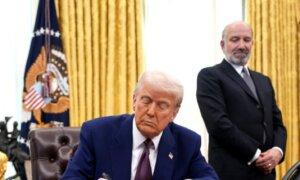7 Nations Challenge U.S. National Security Review of Copper Imports
Leading copper exporters assert that their shipments do not compromise U.S. national security, as the Trump administration evaluates potential tariffs.
Seven U.S. trading partners have officially contested a federal inquiry aimed at determining whether copper imports pose a national security threat.
In publicly available letters, each government argued that their copper exports bolster U.S. supply chains without compromising defense, energy, or infrastructure readiness.
The investigation commenced on March 10 under Section 232 of the Trade Expansion Act of 1962.
“Copper is a fundamental material vital to the national security, economic prowess, and industrial resilience of the United States,” the executive order states. “Copper, scrap copper, and copper’s derivative products are integral to defense applications, infrastructure, and emerging technologies such as clean energy, electric vehicles, and sophisticated electronics. The United States currently faces notable vulnerabilities in the copper supply chain, with an increasing dependence on foreign sources for mined, smelted, and refined copper.”
Chile, as the largest supplier of refined copper to the U.S., stated in its letter that its exports are crucial for American industries.
“Copper imports from Chile significantly enhance the security of the United States’ supply chain and do not pose any risk to its national security interests,” wrote Chilean Ambassador Juan Gabriel Valdés.
Canada highlighted its position as a close ally and a primary market for U.S. copper exports, noting that the bilateral copper trade benefits both economies and supports defense-related manufacturing.
The Canadian government asserted in its correspondence that “imports of Canadian copper do not pose any threat to U.S. national security.”
“On the contrary, imports of copper from Canada bolster U.S. national security and support domestic industries in strengthening supply chains,” they stated. “Both Canadian and U.S. copper producers face vulnerabilities to market manipulation by non-allied producers throughout the supply chain, particularly in the refining sector. Canada shares the United States’ aim of reducing reliance on imports from non-market-based suppliers in non-allied nations.”
Peru emphasized that its exports help fulfill U.S. demand for copper necessary for clean energy, transportation, and electronics, referring to a 2024 memorandum of understanding with the U.S. regarding cooperation on critical minerals.
“The Government of Peru confidently asserts that Peruvian copper exports do not threaten U.S. national security,” the Ministry of Foreign Trade and Tourism indicated. “Peru serves as a dependable trade partner that fortifies the United States copper supply chain and enhances the competitiveness of various key industries, such as electronics, renewable energy, and automotive, by providing essential inputs like copper cathodes, bars, refined copper wire, and plates.”
Indonesia cautioned that any new measures could increase costs for U.S. manufacturers and diminish American copper exports to Indonesian buyers. The government highlighted that U.S. companies have made substantial investments in Indonesia’s mineral sector and would face uncertainty if new trade restrictions are imposed.
South Korea pointed to its investments in U.S.-based battery and electronics production. Korean officials noted that copper from South Korea is primarily used in construction and civilian infrastructure rather than defense, warning that new tariffs might hinder industrial growth.
China deemed the investigation unwarranted, stating that its copper exports to the U.S. are minimal. The country argued that invoking national security in trade matters could jeopardize the stability of global supply chains.
In parallel, the European Union shared similar concerns, asserting that its exports are vital to the U.S. energy and manufacturing sectors and should not be targeted.
According to Trump’s executive order, Section 232 investigations must be concluded within 270 days, placing the current review on course for completion in November.
The agency has yet to release any preliminary findings and did not respond to requests for comments regarding the letters or a status update on the investigation prior to publication.




